牛津高中英语模块2__unit1_project
- 格式:pdf
- 大小:4.48 MB
- 文档页数:32
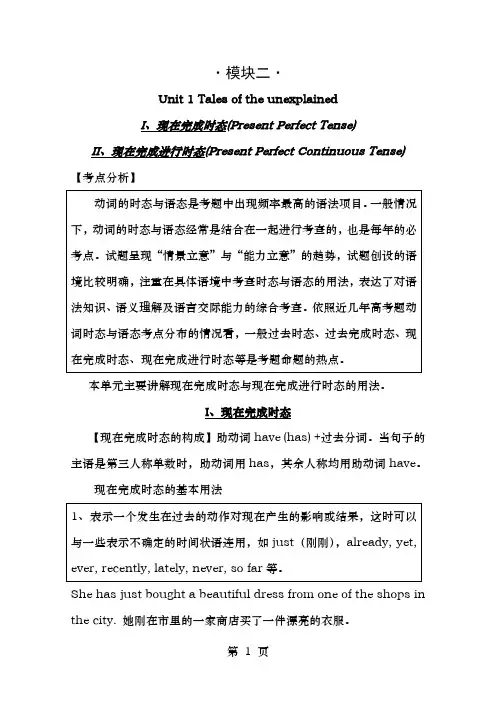
·模块二·Unit 1 Tales of the unexplainedI、现在完成时态(Present Perfect Tense)II、现在完成进行时态(Present Perfect Continuous Tense)【考点分析】本单元主要讲解现在完成时态与现在完成进行时态的用法。
I、现在完成时态【现在完成时态的构成】助动词have (has) +过去分词。
当句子的主语是第三人称单数时,助动词用has,其余人称均用助动词have。
现在完成时态的基本用法She has just bought a beautiful dress from one of the shops in the city. 她刚在市里的一家商店买了一件漂亮的衣服。
We’ve done a lot of work on the project, but we haven’t completed it yet. 我们在工程方面花了不少功夫,但是到现在还没有完成。
--Are you going to further your studies after graduation?——毕业后你打算进修吗?--Well, I haven’t decided yet. I might make some other choices.——嗯,我还没有决定。
我可能会做其他选择。
So far, scientists have named about 1.8 million living species, and that is just a small number of what probably exists on Earth.到现在为止,科学家已经命名了一千八百万种有生命的物种,而这仅仅是地球上可能存在的物种的很小一部分。
The marathon has been an Olympic event since the modern game started in 1896. 自从1896年现代奥运会开始以来,马拉松一直都是奥运会的比赛项目。
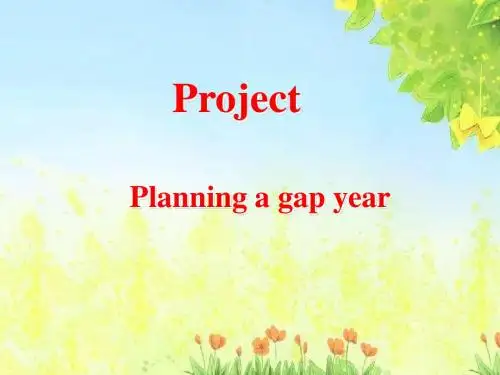
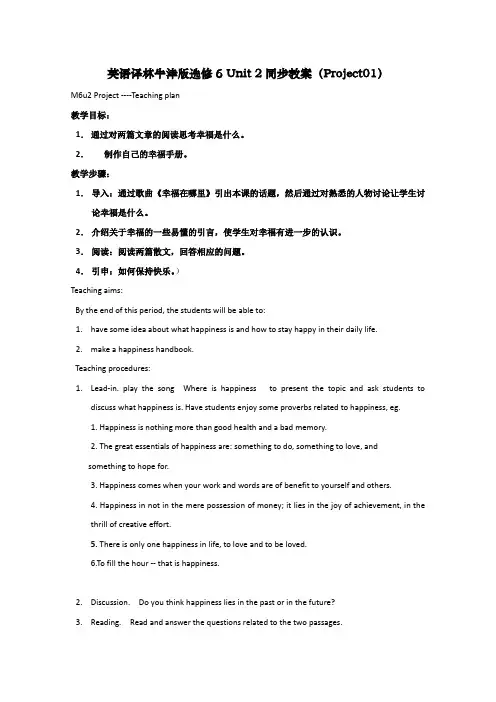
英语译林牛津版选修6 Unit 2同步教案(Project01)M6u2 Project ----Teaching plan教学目标:1.通过对两篇文章的阅读思考幸福是什么。
2.制作自己的幸福手册。
教学步骤:1.导入:通过歌曲《幸福在哪里》引出本课的话题,然后通过对熟悉的人物讨论让学生讨论幸福是什么。
2.介绍关于幸福的一些易懂的引言,使学生对幸福有进一步的认识。
3.阅读:阅读两篇散文,回答相应的问题。
4.引申:如何保持快乐。
)Teaching aims:By the end of this period, the students will be able to:1.have some idea about what happiness is and how to stay happy in their daily life.2.make a happiness handbook.Teaching procedures:1.Lead-in. play the song Where is happiness to present the topic and ask students todiscuss what happiness is. Have students enjoy some proverbs related to happiness, eg.1. Happiness is nothing more than good health and a bad memory.2. The great essentials of happiness are: something to do, something to love, andsomething to hope for.3. Happiness comes when your work and words are of benefit to yourself and others.4. Happiness in not in the mere possession of money; it lies in the joy of achievement, in thethrill of creative effort.5. There is only one happiness in life, to love and to be loved.6.To fill the hour -- that is happiness.2.Discussion. Do you think happiness lies in the past or in the future?3.Reading. Read and answer the questions related to the two passages.Passage A:1.Is the writer old or young? How do you know that?2.What times does the wrier consider to the happiest of his life?3.What does the writer think young people can do while old people can’t?Passage B:4.Is the writer a teenager or an adult?5.What does the writer think an adult can do while a teenager can’t?4.Extension. Tell the students some ideas about how to stay happy.Set goals smile more learn to shareready to help others have a young heartharmony with all kinds have a good sense of humorwilling to forgive enjoy the familymaintain high confidence respect the weakerfinally, money is not everything5.Ask students to review the opinions on the happiness that they have learnt in this lesson.Then ask them each to write an essay about their own ideas of happiness.6.Presentation. Divide the whole class into four groups and ask them to make a happinesshandbook and present it before class.阅读理解。


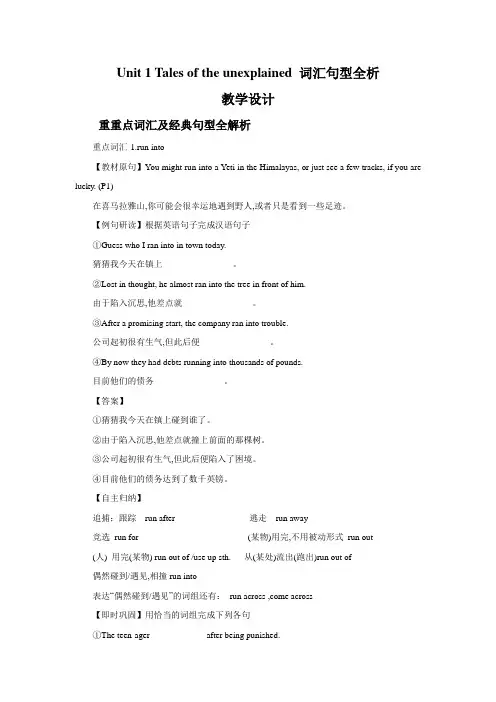
Unit 1 Tales of the unexplained 词汇句型全析教学设计重重点词汇及经典句型全解析重点词汇-1.run into【教材原句】You might run into a Yeti in the Himalayas, or just see a few tracks, if you are lucky. (P1)在喜马拉雅山,你可能会很幸运地遇到野人,或者只是看到一些足迹。
【例句研读】根据英语句子完成汉语句子①Guess who I ran into in town today.猜猜我今天在镇上________________。
②Lost in thought, he almost ran into the tree in front of him.由于陷入沉思,他差点就________________。
③After a promising start, the company ran into trouble.公司起初很有生气,但此后便________________。
④By now they had debts running into thousands of pounds.目前他们的债务________________。
【答案】①猜猜我今天在镇上碰到谁了。
②由于陷入沉思,他差点就撞上前面的那棵树。
③公司起初很有生气,但此后便陷入了困境。
④目前他们的债务达到了数千英镑。
【自主归纳】追捕;跟踪run after 逃走run away竞选run for (某物)用完,不用被动形式run out(人) 用完(某物) run out of /use up sth. 从(某处)流出(跑出)run out of偶然碰到/遇见,相撞run into表达“偶然碰到/遇见”的词组还有:run across ,come across【即时巩固】用恰当的词组完成下列各句①The teen-ager after being punished.②He didn't want to president that year.③She was so sleepy that she a lamppost.④Do your homework before you time .⑤All the students the classrooms as soon as the bell rings.【答案】①ran away ②run for③ran into ④run out of⑤run out of重点词汇-2. step up【教材原句】Police in America have stepped up their search for a fifteen-year-old boy who went missing three days ago in Dover, New Hampshire. (P2)美国警方现已加紧对一名15岁男孩的搜索,该男孩于三天前在新罕布什尔州的多佛市失踪。



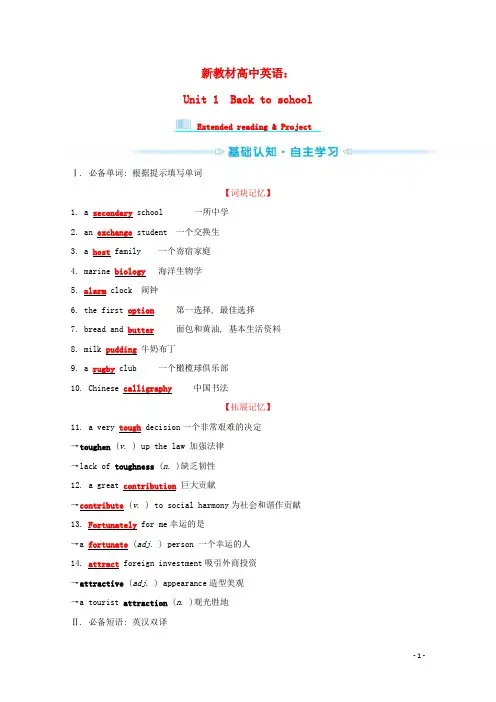
新教材高中英语:Unit 1 Back to schoolExtended reading & ProjectⅠ. 必备单词: 根据提示填写单词【词块记忆】1. a secondary school 一所中学2. an exchange student 一个交换生3. a host family 一个寄宿家庭4. marine biology海洋生物学5. alarm clock 闹钟6. the first option第一选择, 最佳选择7. bread and butter面包和黄油, 基本生活资料8. milk pudding牛奶布丁9. a rugby club 一个橄榄球俱乐部10. Chinese calligraphy中国书法【拓展记忆】11. a very tough decision一个非常艰难的决定→toughen (v. ) up the law 加强法律→lack of toughness (n. )缺乏韧性12. a great contribution巨大贡献→contribute (v. ) to social harmony为社会和谐作贡献13. Fortunately for me幸运的是→a fortunate (adj. ) person 一个幸运的人14. attract foreign investment吸引外商投资→attractive (adj. ) appearance造型美观→a tourist attraction (n. )观光胜地Ⅱ. 必备短语: 英汉双译1. over time随着时间的流逝, 久而久之2. get on well相处得好, 相处愉快3. make a contribution做贡献4. start with从/以……开始5. can’t wait for sb. to do sth. 等不及某人做某事6. make friends with 与……交朋友7. be different from 与……不同Ⅲ. 必备句式: 补全课文原句, 并体会其用法1. I like it so much that I still use it as my alarm!译文: 我非常喜欢它, 所以我现在还用它当闹钟呢!2. Although there was not as much homework as I was used to, it was still challenging.译文: 虽然没有我以前做的那么多作业, 但仍然很有挑战性。

英语必修2译林牛津版Unit 1教案13(Project)Period Thirteen ProjectⅠ.Teaching aims:1. Enable students to tell a mysterious story.2. To learn and master some language points in project.Ⅱ.Teaching important and difficult points:1. How to tell a mysterious story.2. Help the students understand some language points and know how to use them.Ⅲ.Teaching methods:Task-based activity and explanationⅣ.Teaching aids:Multi-media教师高考扫荡狂练:完形填空—夹叙夹议69.Once, it was in the middle of a personal development workshop. One of the people present stood up and began1out diamond rings to each of the one hundred people in the room.He was a2jeweler, he said, and he had made these expensive3as gifts to open people’s eyes to the abundance (充裕) of life.On his fifth birthday, the man4, his uncle had taken him to a candy5and told him that he could take6he wanted, and as much as he wanted. 7he was very pleased and decided to 8something he liked best.The entire store was9to him. He had looked at the jars and plates, an d he hadn’t known where to10. At last, he filled a bag with all his11candies. He didn’t take everything, 12that feeling of being able to have whatever he wanted seemed to make him very13.Since then, he said, he had been able to14the abundance of life. He saw the world as full of 15, richness and beauty—all you had to do was, take your pick and fill your bag.The sad truth is that most of us grow up with the16feeling—we develop a poverty mentality(贫穷心理). We17be lieve that there simply isn’t enough. We think we have to18, fight and struggle, so that we can get what we need and want. If we can’t19our hands to get, someone else will be searching through our pockets. The20of that mentality is that we all have to go hungry.Get a taste of abundance and try to have a great life!1. A. givingB. lendingC. showingD. borrowing2. A. poorB. strongC. richD. popular3. A. necklacesB. watchesC. medalsD. rings4. A. complainedB. explainedC. suggestedD. expected5. A. schoolB. factoryC. storeD. yard6. A. whateverB. whereverC. whicheverD. whomever7. A. UnfortunatelyB. Sadly C. SilentlyD. Certainly8. A. refuseB. acceptC. chooseD. change9. A. smallB. openC. emptyD. closed10. A. beginB. workC. stayD. end11. A. cheapB. famousC. expensiveD. favorite12. A. andB. orC. butD. nor13. A. worriedB. excitedC. interestedD. surprised14. A. searchB. inventC. loseD. notice15. A. opportunitiesB. troubles C. sorrowsD. quarrels16. A. boringB. normalC. oppositeD. natural17. A. hardlyB. alwaysC. neverD. less18. A. leaveB. continueC. stopD. compete19. A. reach outB. put up C. take backD. work with20. A. promise B. resultC. successD. hope参考答案69.ACDBC ADCBA DCBDA CBDAB:Ⅴ.Teaching Procedures:Step 1 GreetingsGreet the whole class as usual.Step 2. Telling a mysterious storyThe storyteller of each group tell a story to the whole class.Step 3. Language Points:1.mystery (P18) n. 神秘,神秘之事mysterious adj. 神秘的2.The Yeti is said to be a large, hairy animal that walks on two feet like a human being.据说,野人体格粗壮、多毛。